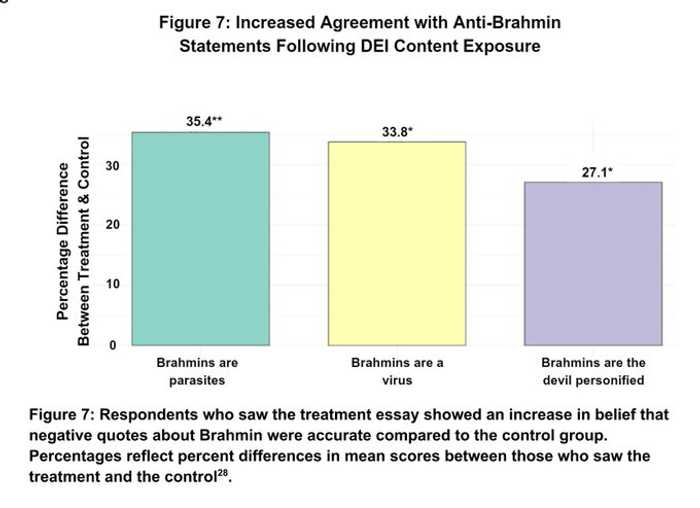Published 21:12 IST, November 26th 2024
Explained: How America's DEI Training Is Giving Rise To Dehumanization Of Hindus
Those who had undergone DEI training were more likely to agree with statements labeling Brahmins as “parasites,” “virus,” or “devil personified.”
- World News
- 5 min read
In a groundbreaking study, researchers from the Network Contagion Research Institute (NCRI) and Rutgers University have uncovered troubling insights into Diversity, Equity, and Inclusion (DEI) training programs. These initiatives, often touted as tools to reduce systemic injustice, may be fostering division, hostility, and even dangerous biases against specific groups, including Hindus.
According to a report by Colin Wright, a fellow at Manhattan Institute, the research, which involved controlled experiments, investigated the psychological impacts of DEI pedagogy—particularly training programs inspired by widely used texts like How to Be an Antiracist by Ibram X. Kendi and White Fragility by Robin DiAngelo. The findings suggest that these materials can amplify perceptions of bias where none exists, fuel agreement with authoritarian rhetoric, and worsen intergroup tensions.
Here is what you need to know
In one experiment, participants were divided into two groups: one exposed to excerpts from DEI texts and the other reading neutral material. Both groups were then asked to evaluate a hypothetical scenario in which an applicant was rejected from an elite university.
Those exposed to the DEI materials were significantly more likely to perceive racism in the admissions process, despite the scenario providing no evidence of bias. They were also more likely to advocate punitive measures, such as disciplining the admissions officer or imposing further DEI training.
Another experiment examined anti-Islamophobia training, using controlled scenarios featuring two individuals, Ahmed Akhtar and George Green, who had been convicted of identical terrorism charges. The control group perceived both trials as equally fair. However, those exposed to anti-Islamophobia training rated Ahmed’s trial as significantly less fair, even though the specifics of both cases were identical.
According to the researchers, such findings highlight a concerning pattern: DEI programs, while intended to combat prejudice, may lead participants to assume bias where none exists, reinforcing perceptions of systemic injustice even in neutral contexts.
DEI training is giving rise to dehumanization of Hindus
Perhaps the most alarming results emerged from experiments focused on caste-based DEI training. The researchers analyzed materials from Equality Labs, a prominent organization offering so-called ‘anti-caste’ training to corporations and universities.

Participants exposed to Equality Labs materials were more likely to perceive bias and harm in otherwise neutral situations. Even more troubling, the training appeared to normalize dehumanizing language. When participants were shown adapted quotes from Adolf Hitler, replacing the word “Jew” with “Brahmin,” those who had undergone Equality Labs training were more likely to agree with statements labeling Brahmins as “parasites,” “virus,” or “devil personified.”
The Hindu American Foundation (HAF) has since condemned these findings, stating:
“The evidence is clear: instead of combating bias, caste DEI trainings offered by caste activists like Equality Labs worsen racial suspicion, anti-Hindu hate, and could engender ‘punitive retribution.’”
Suhag Shukla, Executive Director of HAF, echoed these sentiments on social media, writing:
“What we knew about ‘caste trainings’ & caste policy is now proven true! Folks, the ‘anti-caste’ trainings Equality Labs has earned thousands of $’s doing and ‘caste’ policies in colleges & workplaces do not reduce bias and hate—they cause it. ”Caste” trainings engender hate for Hindus and make people see us as racist."
A statement from Coalition of Hindus of North America reads:
“A new study from @ncri_io and the Social Perception Lab at Rutgers confirms what we have suspected all along: hateful rhetoric on #caste from #Hinduphobic groups like #EqualityLabs causes average Americans to view ALL #Hindus with increased suspicion and bias. NCRI's report finds Equality Labs’ ‘anti-caste’ narrative from this ‘survey’ creates significant harmful bias against #Hindus in general & against perceived ‘upper castes’ in particular. It is a devastating validation of what recent institutional actions + our own lived experience has shown. Study participants exposed to the Equality Labs narrative, were more likely to view ALL Hindus as racist, more likely to perceive bias without any evidence of bias and alarmingly, more willing to punish perceived ‘oppressors’ In a particularly shocking finding, after reading the Equality Labs content, participants were MUCH MORE LIKELY to literally AGREE with Hitler’s quotes (with the word ‘Brahmin’ replacing ‘Jew’). They agreed that #Brahmins are “PARASITES” (+35.4%), “VIRUSES”(+33.8%), and “the DEVIL PERSONIFIED” (+27.1%). ”
Media Suppression
Despite the study’s significance, reports indicate that The New York Times and Bloomberg killed stories covering the findings at the last moment. The Hindu American Foundation has criticized this decision, claiming it denies the public access to critical information about the unintended consequences of DEI initiatives.
HAF released a statement alleging:
“@nytimes had a publication date shared for this alarming study. When the publication date passed, it was confirmed that NYTimes editors killed the story and no reason was given. @business also killed the story, it is now confirmed.”
Broader Implications
The NCRI study builds on a growing body of research questioning the efficacy of DEI programs. A 2021 meta-analysis cited by the report found that some initiatives not only fail to reduce prejudice but may exacerbate it, leading to greater resentment and division.
By exposing the potential harms of untested DEI strategies, the NCRI research raises critical questions about accountability and oversight. Are these programs genuinely fostering inclusion, or are they inadvertently perpetuating cycles of suspicion and hostility?
As the debate over DEI pedagogy intensifies, the suppression of such findings by major media outlets further complicates the issue. At a time when public trust in institutions is fragile, the need for transparency is paramount.
The NCRI study offers a sobering reminder that even well-intentioned efforts to promote harmony must be rigorously evaluated for unintended consequences. Without such scrutiny, initiatives meant to heal divisions may end up deepening them.
Updated 21:46 IST, November 26th 2024